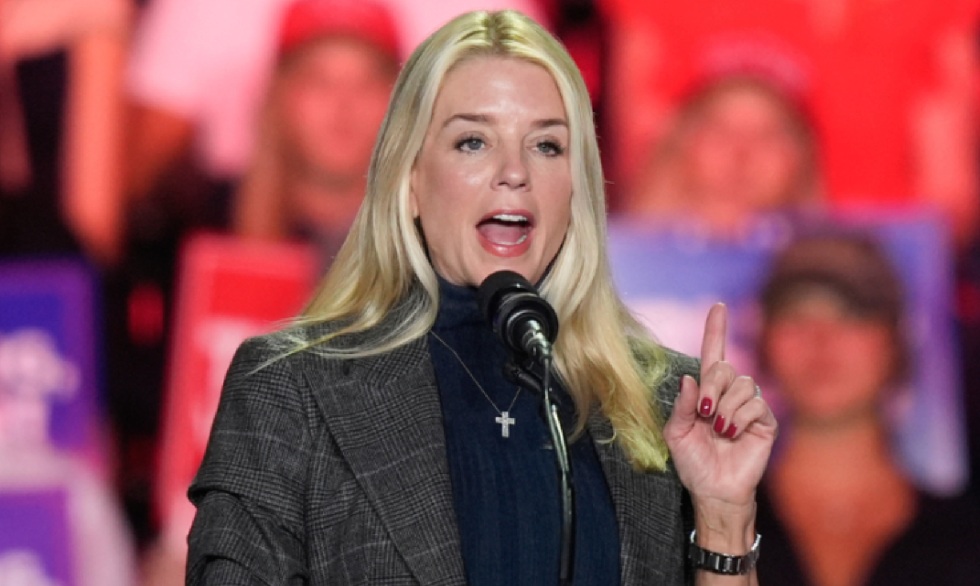
Corporate lobbyists are pushing to put all labor law under the control of Trump’s Attorney General Pam Bondi. | Luke Garratt/AP
WASHINGTON—A coalition of corporate chieftains and lobbies, including the Chamber of Commerce and the National Association of Manufacturers, wants to roll back labor law by putting unilateral power to revoke everything, including the existence of the National Labor Relations Board, in the hands of Donald Trump’s Attorney General, Pam Bondi.
So warn two labor law experts, former National Labor Relations Board (NLRB) Chair Lauren McFerran and Lynn Rhinehart, former general counsel for the AFL-CIO, writing for the Economic Policy Institute.
Rhinehart and McFerran quote a joint letter from the corporate coalition, the so-called Coalition for a Democratic Workplace, to Bondi. The coalition reminds her a Trump executive order earlier this year gives the president ultimate power to overrule all executive agencies, even ones that by law are supposed to be independent, such as the NLRB.
In short, the corporate coalition is extending Trump’s view of an all-powerful presidency—the “unitary executive” backed by the U.S. far right and adopted by dictators worldwide—to U.S. labor law.
Bondi could take that power because Trump’s executive order extended to the Attorney General, too, the corporate chieftains declared. And because the NLRB often reverses itself, depending on which political party holds a majority of seats on the five-member agency board, the Attorney General is free to do likewise, and should.
“An NLRB adjudication is merely an enforcement decision by an executive agency,” the corporate coalition wrote to Bondi, who was one of Trump’s personal lawyers during his impeachment trials before becoming Florida’s Attorney General and U.S. Attorney General.
“Though it acts in some ways like a court, the board is not exercising judicial power. It is making an enforcement decision that is then subject to review by an actual court. Any legal interpretations the board reaches and applies…are simply enforcement positions that, like all executive branch enforcement policies, may be changed at any time.
Seek to disavow Biden decisions
“The NLRB should be instructed to immediately disavow Biden-era precedents that do not reflect the policies of this administration,” the corporate chieftains declare (their emphasis).
“Pursuant to the authority granted to you by the president, we encourage you to direct all NLRB officers and employees to no longer treat the adjudicative determinations” from the Biden board “as binding precedent,” the honchos urge. “These legal interpretations of the prior administration are inconsistent with the U.S. Constitution and/or the NLRA, poorly reasoned decisions that a court would not find persuasive, or simply bad policy.”
And last year, the corporate coalition reminded Bondi, the Supreme Court, in a ruling by the Republican-nominated justices last year, threw out Chevron deference, a 40-plus-year-old precedent saying federal judges must, in most cases, defer to agency expertise in various cases.
That leaves in judges’ hands the decision “whether an agency is approaching a law within its area of expertise fairly, consistently, and deliberately,” the letter notes. In other words, judges—and the Attorney General—should have total freedom to write the rules governing labor law.
What they ignore is that the National Labor Relations Act, the Wagner Act as it is called, is clear that it is the policy of the United States government to encourage collective bargaining, not to kill it as the corporations and Bondi would do.
Revealing the plutocrats’ letter to Bondi for the Economic Policy Institute, and in an analysis reprinted in Harvard’s On Labor blog, the duo warn of absolute chaos in labor law should Bondi follow the corporate demand.
“The decisions in question address important issues like which workers have the right to form and join a union and what remedies are available to workers who are illegally fired in retaliation for exercising their rights in the workplace. Like all decisions issued by the NLRB—a multi-member body that acts as a court to adjudicate labor disputes—they were issued after full briefing and consideration of the issues and are treated as precedent governing subsequent cases,” the duo wrote.
“Ordinarily, the way employers try to get the NLRB to change a decision they disagree with is to challenge the decision on appeal” to federal courts, usually the U.S. Court of Appeals for D.C. “Many of the decisions identified in” the corporate letter to Bondi and its accompanying list of rulings “have been challenged, and those court proceedings are in progress.
“Employers also have the ability to argue to the board in future cases that it should revisit its own precedent. The NLRB would then consider the issue and arguments and decide whether to change its earlier decision.” The federal Administrative Procedure Act (APA) “requires agencies to engage in ‘reasoned decision-making’ when deciding cases. In other words, the agency has to explain itself when it changes course—it can’t just declare a new rule.”
What the corporate coalition wants is to short-circuit all that by putting complete power to reverse labor law in Bondi’s hands, McFerran and Rhinehart write.
“In what would be a radical—and clearly unlawful—departure from these well-established avenues for appeal, the employer coalition has asked Pam Bondi—who has no background or experience in labor relations—to unilaterally invalidate more than a dozen NLRB decisions with the stroke of a pen.”
The corporate chieftains didn’t just write to Bondi. They sent copies of their argument—and the list of Biden-era rulings they want tossed—to two Trump White House domestic policy advisers, to NLRB chair Marvin Kaplan, and to the Republican chairs of both congressional committees dealing with worker-oriented legislation.

